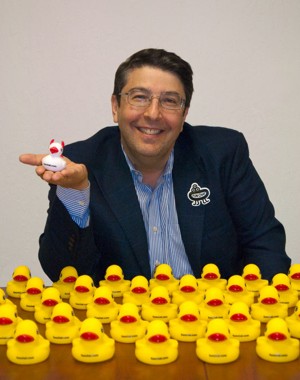FunMobility Keeps the Good Times Rolling with New Smartphone App
FunMobility Keeps the Good Times Rolling with New Smartphone App
FunChat Allows Users to Express Themselves with "Chattitude," Mobile Gaming
"Chattitude" may not be one of the new tech-generated terms to make it into the latest edition of the Merriam-Webster Collegiate Dictionary, but it could certainly become a contender in the future. The word already occupies a spot in the Urban Dictionary, which defines it as "an individual's attitude in a text-based setting such as instant messaging, e-mail, or sms text messaging."
Hacienda-based FunMobility has taken Chattitude to a whole new level of self-expression with the introduction of FunChat, an app for iPhone, iPod Touch, and Android devices that the company rolled out earlier this summer. Creating a new opportunity for the mobile generation to communicate, FunChat blends texting and chatting with mobile social gaming.
Users craft their online personas by selecting from a host of elements: colorful anime like avatars, customizable chat bubbles, sounds, and virtual goods. They interact with each other in combination game/chat rooms, where they can engage in commentary while in the midst of play, congratulating their opponent on a smart move, for example. They can also message friends in private, changing character attributes according to their mood, enlivening the conversation with personalization.
An especially entertaining aspect for the FunChat demographic, consisting primarily of 14 to 24 year olds, is the first mobile pranking engine. This feature lets users send real sound bytes - a kiss, a wolf whistle, a Bronx cheer - to another smartphone, even if it is in standby mode or not running the app. Arriving unexpectedly, the sudden noise is a dependable source of amusement.
From a business perspective, FunChat represents a strategic new direction for the company. FunMobility has always focused on providing entertainment through multimedia features for mobile phones, but its earlier products were aimed at the carrier market, explains founder and CEO Adam Lavine.
With FunChat, the Hacienda-based company is now also courting the end user, jumping into the thick of the mobile social entertainment space and building a public brand. The potential is enormous. According to one expert, 187 billion text messages are sent monthly in the U.S. alone. Another research firm predicts that the mobile games market will approach $8 billion in less than five years.
"This is an opportunity to forge new ways to communicate, especially among younger children," Lavine observes. "We are creating new vehicles for youngsters to connect and hang out, sharing and playing in ways they haven't done before. We've positioned ourselves squarely in the center of these new markets."
At the heart of all the fun and games is FunMobility's multiplayer game engine, standardized on the HTML5 platform to make the system as open as possible. "This helps us attract other developers to build games, giving us more interesting content," Lavine says. "HTML5 offers a richer experience than standard web access and mobile browsers. Rumor has it that the next-generation Facebook will be based on this platform, so we think we are six to nine months ahead of the curve here."
Lavine is confident that the head start is sustainable, especially with the company's dual channel approach. "We are generating revenue from FunChat, and our business from the carrier sector is doing well. We've combined a mature business with a smartphone start-up. It's pretty exciting!" he concludes.
For more information, visit www.funmobility.com.
Photo: CEO Adam Lavine keeps his ducks in a row at FunMobility.
Also in this issue...
- FunMobility Keeps the Good Times Rolling with New Smartphone App
- Setaram Meeting Cutting-Edge Materials Challenges
- Business Bits
- Executive Profile: Paul Brown, Roche Molecular Diagnostics
- Early Hacienda Tenant Penske Keeps Rolling Along
- From Sliced Apples to Fresh Salads, Printpack Can Wrap It Up
- The Tri-Valley Arts Scene is Flourishing
- Pleasanton Green Scene Fair Returns on October 6
- Alameda County Workforce Investment Board Has Strong Employer Focus
- Shepherd's Gate Fundraiser '24 In Your Car' Dramatizes Plight of Mobile Homeless
- Hacienda Helping Hands - Join the Team!
- Pleasanton Green Scene Fair
- Hacienda Index
- Calendar





